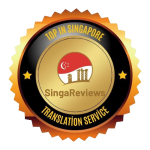
Overcoming Cross-Cultural Business Challenges with Expert Chinese to English Translation Services in Singapore
Singapore stands as Asia’s premier business hub, where East meets West in international commerce. For companies operating in this multicultural landscape, effective communication across the Chinese and English languages has become essential for business success. However, navigating cross-cultural business challenges requires more than basic translation; it demands expert linguistic services understanding cultural nuances and business protocols.
Understanding Cross-Cultural Business Challenges
Cross-cultural business communication presents unique obstacles impacting successful partnerships and market expansion. Research shows that cultural differences significantly affect business interactions, particularly between Chinese and Western business practices. These challenges manifest in various ways:
1. Language Barriers and Communication Styles
Chinese business communication follows indirect patterns, emphasising harmony and relationship-building over confrontation. Western businesses often prefer straightforward, explicit communication, creating potential misunderstandings when these styles clash. Professional translation services bridge these gaps by ensuring messages convey appropriate cultural context alongside literal meaning.
2. Business Etiquette and Protocol Differences
The concept of “face” (mianzi) plays a central role in Chinese business culture, where maintaining dignity and avoiding embarrassment is paramount. Chinese negotiations often involve extensive relationship-building periods, whilst Western businesses may prioritise immediate outcomes. Understanding these cultural nuances through expert translation ensures respectful and effective communication.
3. Technical and Legal Documentation Challenges
Business documents require precise translation to avoid costly misinterpretations. Contract negotiations with Chinese partners involve terminology that carries cultural implications beyond literal translation. Technical documentation must comply with Chinese regulatory standards whilst maintaining clarity for all stakeholders.
The Singapore Advantage in Chinese-English Translation
Singapore’s unique position as a multicultural business hub provides distinct advantages for companies requiring Chinese-English translation services. The city-state’s multilingual population and strategic location make it an ideal gateway for businesses expanding into Chinese-speaking markets.
1. Strategic Location and Cultural Understanding
Singapore serves as a bridge between Western business practices and Asian cultural sensibilities. Local translation services understand simplified Chinese (used in Singapore and mainland China) and traditional Chinese (used in Taiwan and Hong Kong). This regional expertise ensures translations suit specific target markets rather than applying generic approaches.
2. Established Business Infrastructure
The translation services market in Singapore has grown significantly, driven by increasing economic ties with China and the rise of cross-border trade. Professional translation companies in Singapore offer ISO-certified services, ensuring quality standards that meet international business requirements.
3. Growing Demand for Professional Services
Singapore’s translation services market is experiencing notable growth due to the country’s position as a global business hub and multicultural population. Key trends include integrating AI-powered translation tools with human expertise, specialising in sector-specific terminology, and emphasising cultural localisation rather than literal translation.
Essential Translation Services for Business Success
To achieve success in today’s global marketplace, businesses must invest in language solutions that ensure clarity, compliance, and cross‑cultural understanding.
1. Document Translation and Certification
Professional Chinese translation services encompass legal contracts, financial reports, technical manuals, and marketing materials. Certified translations meet government requirements for official submissions to agencies like ICA, MOM, and other regulatory bodies. This certification ensures documents are legally recognised and professionally validated.
2. Interpretation Services for Meetings and Negotiations
Real-time interpretation services facilitate smooth business meetings, conferences, and negotiations. Professional interpreters understand industry-specific terminology and cultural protocols, ensuring effective communication during critical business interactions. These services prove invaluable when building relationships with Chinese business partners who value clear, respectful communication.
3. Localisation for Marketing and Digital Content
Effective marketing requires more than translation; marketers must localise content to resonate with target audiences. This process includes adapting content for different Chinese-speaking regions and considers local preferences, cultural references, and business practices.
Successful digital marketing strategies in China require understanding these cultural nuances to create compelling, culturally appropriate content.
Building Successful Business Relationships
Building strong international business relationships requires a deep appreciation of cultural values and communication styles.
1. Cultural Sensitivity in Communication
Understanding Chinese business culture extends beyond language translation to encompass relationship-building protocols. Guanxi (relationship networks) requires patient investment in trust-building activities. Professional translation services help navigate these cultural expectations by ensuring communications reflect appropriate respect and cultural awareness.
2. Long-term Partnership Development
Chinese businesses often prioritise long-term relationships over immediate transactions. This approach requires consistent, culturally sensitive communication over extended periods. Expert translation services support this relationship-building process by maintaining consistent messaging that respects cultural values whilst advancing business objectives.
3. Trust-Building Through Professional Communication
Accurate, culturally appropriate translation demonstrates professionalism and commitment to Chinese business partners. When contracts and technical documents show linguistic precision and cultural sensitivity, they signal respect for the relationship. This foundation facilitates smoother negotiations, faster decision-making, and stronger long-term partnerships.
Market Expansion Opportunities
Professional translation services are open to vast Chinese-speaking markets across mainland China, Taiwan, Hong Kong, and Singapore.
1. Accessing Chinese-Speaking Markets
Professional translation services are open to vast Chinese-speaking markets across mainland China, Taiwan, Hong Kong, and Singapore. Each region has distinct linguistic preferences and cultural expectations that require specialised knowledge. For companies looking to expand their reach, connecting with over 1 billion Chinese consumers requires strategic approaches that consider these regional differences.
2. Regulatory Compliance and Documentation
Entering Chinese markets involves complex regulatory requirements that demand precise translation of legal and technical documents. Professional services ensure compliance with local regulations whilst maintaining clarity for international stakeholders. This compliance reduces legal risks and facilitates smoother market entry processes.
3. Competitive Advantages in International Trade
Companies that invest in professional Chinese translation services gain significant competitive advantages. Clear communication reduces misunderstandings, accelerates negotiations, and builds stronger business relationships. These benefits translate into improved contract terms, reduced legal risks, faster project implementation, and enhanced business partnerships.
Technology and Human Expertise
Modern translation services combine advanced technology with human expertise to deliver superior results.
1. Integrated Translation Solutions
Modern translation services combine advanced technology with human expertise to deliver superior results. AI-powered tools enhance efficiency for routine translations, whilst human translators handle complex cultural nuances and industry-specific terminology. This hybrid approach ensures both speed and accuracy in translation projects.
2. Quality Assurance and Standards
Professional translation services maintain ISO certifications and rigorous quality control processes. These standards ensure translations meet international business requirements whilst preserving cultural appropriateness. Quality assurance involves multiple review stages, including linguistic accuracy, cultural sensitivity, and technical precision.
3. Specialised Industry Knowledge
Expert translation services employ translators with specific industry backgrounds in finance, legal, medical, technical, and marketing sectors. This specialisation ensures accurate terminology and contextual understanding that generic translation services cannot provide. Industry-specific knowledge proves essential when translating complex technical documents or legal contracts.
Choosing the Right Translation Partner
When selecting translation services, businesses should prioritise providers with relevant certifications and proven track records.
1. Professional Credentials and Certifications
When selecting translation services, businesses should prioritise providers with relevant certifications and proven track records. ISO-certified companies demonstrate commitment to quality standards and professional practices. These credentials assure that translations meet international business requirements.
2. Cultural and Linguistic Expertise
Effective translation partners combine linguistic fluency with deep cultural understanding. They should demonstrate knowledge of source and target cultures, ensuring translations resonate appropriately with intended audiences. This expertise is particularly important when adapting content for different Chinese-speaking regions or business contexts.
3. Comprehensive Service Offerings
Full-service translation providers offer integrated solutions including document translation, interpretation, localisation, and cultural consulting. This comprehensive approach ensures consistent messaging across all communication channels whilst maintaining cultural sensitivity. Businesses benefit from working with single providers who understand their complete communication needs.
Practical Implementation Strategies
Successful businesses develop comprehensive translation strategies that align with their expansion goals.
1. Planning Your Translation Needs
Successful businesses develop comprehensive translation strategies that align with their expansion goals. This planning includes identifying target markets, understanding regulatory requirements, and determining necessary documentation. Essential steps for tapping into the Chinese market provide valuable frameworks for developing these strategic approaches.
2. Building Internal Capabilities
While professional translation services handle complex requirements, businesses also benefit from internal language capabilities. Training staff in basic cultural awareness and business etiquette enhances overall communication effectiveness. This internal knowledge complements professional services whilst building stronger relationships with Chinese business partners.
3. Measuring Success and ROI
Professional translation services provide measurable benefits, including improved contract terms, reduced legal risks, faster project completion, and stronger business relationships. Companies should establish metrics for evaluating translation effectiveness, including relationship quality, negotiation outcomes, and market penetration success.
Future Trends and Opportunities
The translation industry continues to evolve with technological advancements, including AI integration, machine learning, and cloud-based solutions.
1. Digital Transformation in Translation Services
The translation industry continues to evolve with technological advancements, including AI integration, machine learning, and cloud-based solutions. These developments enhance service efficiency while maintaining human oversight for cultural nuances and complex content. Businesses can expect improved turnaround times and cost-effectiveness without compromising quality.
2. Expanding Market Opportunities
Growing economic ties between Singapore and Chinese-speaking regions create expanding opportunities for businesses with effective translation strategies. Government initiatives supporting multilingual business development further enhance these opportunities. Companies with strong translation capabilities can capitalise on these trends for sustainable growth.
3. Integrated Communication Solutions
Future translation services will increasingly offer integrated solutions combining translation, interpretation, cultural consulting, and digital marketing support. This evolution responds to business needs for comprehensive communication strategies that address multiple touchpoints with international partners and customers.
For more insights on expanding your business presence in China, explore our guide on how to succeed in digital marketing in China and learn about strategic approaches to this dynamic market.
Conclusion
Overcoming cross-cultural business challenges requires more than basic translation; it demands expert services understanding linguistic nuances, cultural protocols, and business contexts. Professional Chinese to English translation services in Singapore provide businesses with the strategic advantage to succeed in competitive international markets.
Success in cross-cultural business communication depends on choosing translation partners who combine linguistic expertise with cultural understanding and industry knowledge. These partnerships enable businesses to build stronger relationships, reduce risks, accelerate growth, and achieve sustainable success in Chinese-speaking markets.
For companies seeking to expand their international presence or strengthen existing Chinese business relationships, investing in professional translation services represents a strategic decision that delivers measurable returns through improved communication effectiveness and enhanced business outcomes.
Ready to transform your business communication across cultures? Elite Asia offers comprehensive Chinese to English translation solutions tailored to your needs. Our expert translators combine linguistic precision with cultural sensitivity to ensure your message resonates effectively with Chinese-speaking audiences.
Get Started Today:
- Simplified Chinese Translation and Interpretation Services – Professional services for PRC (People’s Republic of China), Malaysia, and Singapore markets
- Traditional Chinese Translation and Interpretation Services – Specialised solutions for Taiwan and Hong Kong markets
Elite Asia’s experienced team understands the complexities of cross-cultural business communication. Contact us to discover how professional translation services can accelerate your business success in Chinese-speaking markets.










